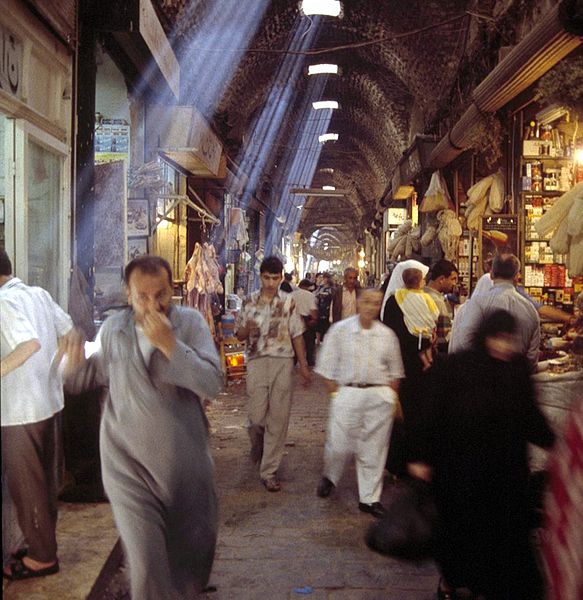
It may be that nobody will ever read it, but I continue to write it, nonetheless:
A brief return trip to Aleppo to check on the condition of the Saints in the branch there was a great disappointment to President Booth. He found them to be, in his view, disobedient, selfish, and unworthy of the blessings they were receiving from the Lord through their knowledge of the restored gospel. In November, he went back again to Aleppo. Along the way, he stopped off in Beirut and Damascus, as well, to see how the few Mormons in those cities were doing. One of his tasks while there was to arrange for the shipment of rugs to Utah. The Church, interested in bettering the material situation of its Armenian members, had begun to invest in their oriental carpet manufacturing and to sell the carpets through ZCMI, its department store in Salt Lake City. Though the idea of a Mormon agricultural settlement had come to nothing, the traditional Latter-day Saint mix of temporal and spiritual things was still very evident in the Near East.
Nonetheless, it could not truly be said that the cause of the Restoration was flourishing in the region. Just prior to his departure from Haifa, President Booth summarized the status of the Church in the Near East in a message that was later published in the Church magazine, the Improvement Era:
Our past and present status may be briefly told by counting up to ten; thus: One lady missionary, two workers in the field today, three cities have served as our headquarters, four elders have died in the field, five nationalities have been baptized, six languages are needed to teach them, seven apostles have been here, eight cities now claim one or more of our members, and nine out of ten are in poverty[1]
It was not, as it must have seemed to him, much to show for the years of care and labor he had devoted to his stewardship. “Your humble servant,” he wrote to the brethren, “has had the pleasure and honor of seventeen years total in the mission field. The task at times has been a difficult one—almost like trying to tear away old Timpanogos with a tooth brush while a man with a team and scraper endeavors to pile it up again.”[2] After nearly eighteen years of missionary service among the peoples of the Near East, he continued to see members who were not living up to the standards they knew to be right, who were still dependent in far too many cases upon foreign missionaries, not only for their spiritual development but for their financial welfare as well.
President Booth managed to express both his deep sense of isolation and his desire for fellow laborers to help him fulfill the monumental task that he well knew stretched out before him. “Besides Sister Booth and Elder Snell, the writer, since he left London, October 2, 1921, has seen on an average only one face from Zion in 202 days, so you may be sure of a warm welcome if you come to do missionary work.” Elder Talmage had promised him that three pairs of missionaries would be sent from the European Mission to work with him and his wife. By the time he left for his trip to Aleppo, however, they had still not arrived. But a note from Elder Talmage had come, containing the reassuring words, “You may think we have forgotten you, but we have not.” Upon receiving these words of comfort, Joseph W. Booth, still working alone with only his wife as a companion in a faraway land of many languages and exotic customs, exclaimed, “In heaven’s name who would not proselyte for such [a] cause, where the harvest is so great and the laborers are so few?” [3]
President Booth’s mission, however, was finished. He was worn out, exhausted. He died of a heart attack on 5 December 1928, unaware that his release, signed by the First Presidency, was in the mail. The Church, grateful for the services he had rendered, erected a large headstone over his burial place in the sandy and desolate foreigners’ cemetery on the outskirts of Aleppo. Nearly five years later, Elder John A. Widtsoe dedicated his grave.
Joseph Wilford Booth was certainly the greatest missionary of the Church of Jesus Christ of Latter-day Saints yet to serve in the Near East. Yet he has been virtually forgotten. That is why I have chosen to dedicate this book to his memory and to his example of devoted and competent service among the peoples of the eastern Mediterranean.
[1] See Joseph W. Booth, “The Armenian Mission,” in Improvement Era 31 (October 1928), 1048-52. The quotation occurs on pp. 1048-49.
[2] Booth, “The Armenian Mission,” 1050.
[3] Both quotations occur at Booth, “The Armenian Mission,” 1052.
Posted from Richmond, Virginia










